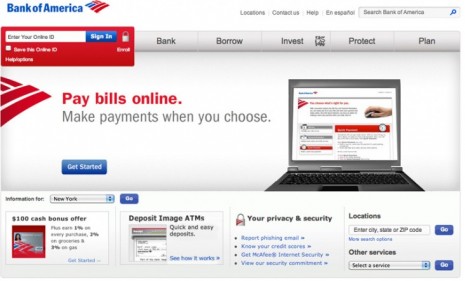Did hackers target Bank of America's website?
Customers already enraged by a fee hike encountered problems accessing accounts online for six days. Was it a glitch, or something more sinister?

A free daily email with the biggest news stories of the day – and the best features from TheWeek.com
You are now subscribed
Your newsletter sign-up was successful
Bank of America's website returned to normal on Wednesday, but not until customers had endured a full six days of error messages and excruciatingly slow service. The problems started suddenly, and mysteriously, a day after the bank announced a hugely unpopular $5 debit card fee last week. Many customers were already threatening to switch banks over the new fee — now they're really seething. Bank of America denied it had been attacked by hackers, but offered only foggy explanations for days. Here, a brief guide to the ordeal:
Why are Bank of America customers so mad?
The duration of the bank's online problems was "unprecedented," says Shawn White, a vice president for web-monitoring service Keynote Systems, as quoted in ComputerWorld. It's "shocking" that brownouts and slowdowns — taking up to a minute to complete a simple transaction — persisted as long as they did, he said, as the bank knows customers depend on its site to make payments. And the bank's failure early on to say why the site was slow didn't help. Bank of America has been looking into the root of the problem, said spokeswoman Tara Burke. "We're not going to get into the technical details."
The Week
Escape your echo chamber. Get the facts behind the news, plus analysis from multiple perspectives.

Sign up for The Week's Free Newsletters
From our morning news briefing to a weekly Good News Newsletter, get the best of The Week delivered directly to your inbox.
From our morning news briefing to a weekly Good News Newsletter, get the best of The Week delivered directly to your inbox.
What made people suspect hackers?
Mainly the "absence of a fuller explanation," says Martha C. White of TIME. The symptoms suggested a denial-of-service attack — a barrage of traffic aiming to overload a website's servers. Such attacks are potentially crippling, but relatively simple to engineer. "The only reasonable conclusion is that they are under attack," said internet security expert Steve Gibson. "A site of that size should be expected to handle huge volume with no trouble at all."
Is there any other explanation?
On Thursday morning, Bank of America's head of mobile and online banking, David Owen, said the company was adding new features while also facing heavy month-end traffic. The bank consulted police and outside experts, and turned up no evidence of hackers. "There is nothing that points to a third-party intervention," Owen said. Some people believed that a January outage on the website was the result of an attack by WikiLeaks advocates "Anonymous," a suspicion fueled after WikiLeaks founder Julian Assange hinted that the whistle-blower site's next leak would target a large bank. That outage, however, was eventually blamed on a glitch in a routine system change.
A free daily email with the biggest news stories of the day – and the best features from TheWeek.com
Sources: ComputerWorld, TIME, ABC News, Huffington Post, CNN
-
 The Week Unwrapped: Have televised confessions quelled protests in Iran?
The Week Unwrapped: Have televised confessions quelled protests in Iran?Podcast Plus, why has Elon Musk turned from Mars to the Moon? And will the BBC prove to be a puzzles champ?
-
 The week’s best photos
The week’s best photosIn Pictures An Andean god, a rogue squirrel, and more
-
 AI surgical tools might be injuring patients
AI surgical tools might be injuring patientsUnder the Radar More than 1,300 AI-assisted medical devices have FDA approval